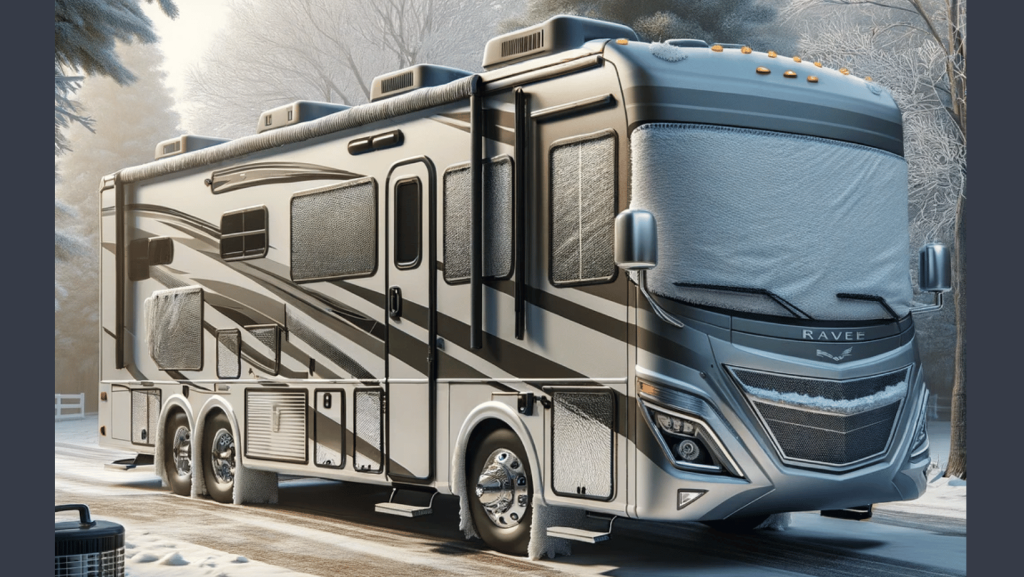
As the weather starts to cool down and winter approaches, it’s important for RV owners in Seguin & Comfort, Texas to start thinking about winterizing their RVs. Properly preparing your RV for the colder months can help prevent costly damage and keep your vehicle in top shape for future travels. You might be asking, “How do I winterize my RV myself?”. In this blog, we’ll go over some helpful tips and tricks for winterizing your RV.
What is RV winterization?
RV winterization is the process of preparing your recreational vehicle for the colder temperatures and harsh conditions that come with winter. This includes draining water systems, adding antifreeze, and protecting the exterior of the RV from potential damage caused by snow, ice, and freezing temperatures.
If you plan on storing your RV during the winter months, proper winterization is essential to prevent any damage that may occur while it’s not in use. However, even if you plan on using your RV throughout the winter, it’s still important to take steps to protect your vehicle from potential weather-related issues.
Do RVs need to be winterized? Do all RV types need to be winterized? The simple answer is yes, especially if you live in an area that experiences freezing temperatures during the winter. Neglecting to properly winterize your RV can lead to costly repairs and damage that could have been easily prevented.
What temperature should my RV be winterized at?
The general rule of thumb is to winterize your RV when temperatures are consistently below freezing (32°F/0°C). However, it’s always best to err on the side of caution and start the process earlier if possible. It’s better to be safe than sorry when it comes to protecting your RV from potential damage.
Top 6 Tips on how to winterize an RV
- Drain and flush all water systems. It is crucial to properly drain and flush out your RV’s fresh water tank, hot water heater, and all plumbing lines. This is because any lingering water left in these components can freeze in cold temperatures, leading to the potential risk of burst pipes or cracked tanks.This is common practice for safely storing an RV.
- Add antifreeze. Once the tanks are completely emptied, it is advisable to add non-toxic RV antifreeze through the freshwater system. This will effectively protect your system from any potential damage caused by freezing. By doing so, you can ensure that any remaining water within the system is safeguarded, giving you peace of mind during the colder months.
- Protect your RV’s exterior. To ensure snow and ice stay out, it’s important to cover all external vents and openings. Also, consider investing in a high-quality cover specifically designed for RVs. These covers provide an extra layer of protection, shielding the exterior from potential weather damage caused by rain, hail, or harsh UV rays.
- Check tire pressure. During cold temperatures, the air inside your tires may contract, leading to a decrease in tire pressure. It is important to regularly check your tire pressure and inflate them as needed to ensure optimal performance and safety. By staying proactive and taking this simple step, you can maintain the proper tire pressure and enjoy a smooth and safe driving experience even in colder weather conditions.
- Inspect the roof. Before the winter season arrives, it is highly recommended to thoroughly inspect your RV’s roof for any signs of cracks or damage. Pay close attention to potential vulnerabilities that may have developed over time. If any issues are found, it is crucial to promptly address and repair them to prevent further damage.
- Clean and store properly. Before storing your RV for the winter, it’s important to ensure a thorough cleaning of the interior. This includes removing all food items, draining tanks to prevent any residual build-up, and disconnecting batteries to avoid any potential drainage.
Wrapping Up RV Winterization
At AmericaGoRV, your top RV Dealer in Seguin & Comfort, Texas, we believe that properly winterizing your RV is an important step in protecting your investment and ensuring it’s ready for future travels. You can have peace of mind knowing your RV is protected from potential cold weather damage by following these tips and taking the necessary precautions. So don’t delay, start your winterization process today! Happy camping!
Frequently Asked Questions about RV Winterization
Q: Do I need to winterize my RV if I live in a warmer climate?
A: Yes, it’s still important to take steps to protect your RV even in warmer climates. Unexpected cold snaps or traveling to colder areas can still result in potential damage.
Q: Can I use regular antifreeze in my RV?
A: No, regular antifreeze is not safe for RV water systems. Make sure to use non-toxic RV antifreeze specifically made for this purpose.
Q: How often should I check on my stored RV during the winter?
A: It’s a good idea to check on your RV every few weeks to make sure everything is still in good condition and to empty any accumulated snow or ice from the roof.
Q: Should I keep my RV’s batteries connected during winter storage?
A: It’s best to disconnect and remove the batteries from your RV during winter storage, as they can drain quickly in cold temperatures.
Q: Can I winterize my RV myself or should I hire a professional?
A: It is possible to winterize your RV yourself, but if you’re unsure of the process or want to ensure it’s done correctly, it may be best to hire a professional.
